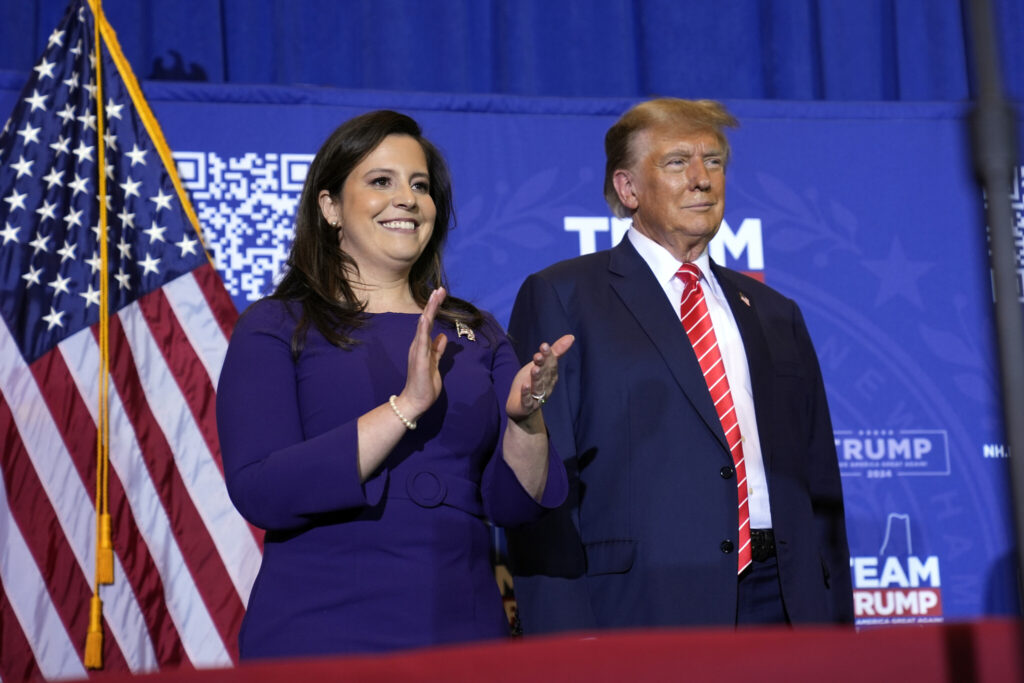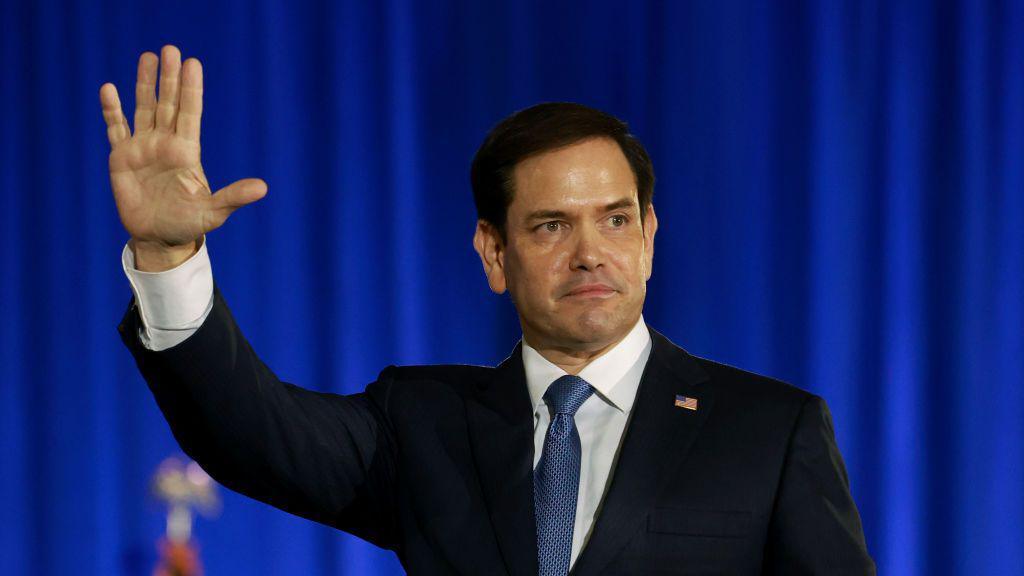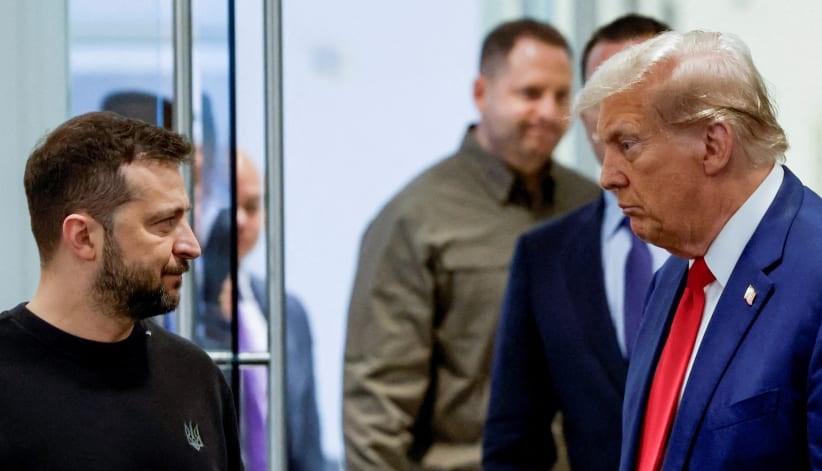President-elect Trump will take office at the White House on 20 January, after electors formally cast their votes on 17 December for their states’ chosen candidates and sent the results to Washington.
World leaders and Ukraine are holding their breath to face a new kind of Trump foreign politics that is still unknown and may be unpredictable.
The upcoming Trump presidency poses significant challenges for Ukraine. During his presidential campaign, Trump said he would end the war in Ukraine within 24 hours and wouldn’t commit to approving additional US aid to Ukraine if reelected.
According to experts, the worst-case scenario for Ukraine under a Trump presidency would be the US cutting off military assistance and Trump attempting to force Ukraine into a negotiated settlement with Russia on terms favorable to Putin, which includes ceding occupied territory to Russia.
Euromaidan Press spoke to experts on the likelihood of the worst-case scenario and how Ukraine can develop new approaches to preserving vital military aid, maintaining US attention on the war, and securing continued US leadership in supporting Ukraine against Russian aggression.
Trump’s return a “challenge, not disaster” for Ukraine
Mykola Murskyi, a Director of advocacy at the US-based aid NGO Razom for Ukraine, said that Trump’s election win is not a disaster for Ukraine or American policy toward Ukraine.
“But it is indeed a big challenge,” he added, explaining that Trump’s statements about “ending the war in 24 hours” and his running mate J.D. Vance’s more explicit calls for forcing Ukraine into negotiations with Russia will require increased advocacy work to overcome.
According to Murskyi, Ukrainian organizations will need to work intensively with Trump’s transition team to explain why stopping weapons deliveries to Ukraine won’t end the war.
Oleksandr Merezhko, chair of Ukraine’s parliamentary foreign affairs committee, told Euromaidan Press the worst possible scenario would be if the US cuts off military and technical assistance, potentially leading to Trump forcing Ukraine into negotiations with Putin under terms favoring Russia.
Trump has repeatedly claimed to end the war in 24 hours. Though he hasn’t presented any plan, it is largely expected to involve Ukraine ceding land to Russia. Kyiv has repeatedly stated that Ukraine cannot discuss concessions regarding security or territorial integrity.
However, Merezhko does not believe the worst-case scenario would come to fruition under Trump: the American political system has safeguards that limit the president’s free will.
“Trump cannot do whatever he wants without the approval of other institutions,” he explained.

Alyona Getmanchuk, founder and director of the New Europe Center think tank and freelance senior analyst at the Atlantic Council’s Eurasian Center (USA), told Euromaidan Press that if such a deal forces Ukraine into de facto capitulation and without security guarantees, it could trigger Russia to new and potentially more extensive aggression by the middle or end of Trump’s term—not only against Ukraine but possibly other countries in the region.
“Ukraine will look like a country that was given up to Putin, and Trump will look like a person who handed Putin victory in the war and helped him rebuild the actual Russian empire,” she said.
Expert of the Foreign Policy Council Ukrainian Prism, director of the North America Program Oleksandr Kraiev, told Euromaidan Press that the probability of the most catastrophic scenario following Trump’s team announcements has slightly decreased.
According to Kraiev, Trump is taking into account the mistakes of his first presidential term, 2017-2021, and is trying to make his team more representative than during his first term. There are a much larger number of women, conservatives, not just Trumpists, moderate Republicans.
“He’s [Trump – ed.] not just going with his loyalists and radicals. He’s seeking more balanced representation, which could be more positive for Ukraine,” he said.
Merezhko says to avoid the worst-case scenario, Ukraine needs to understand Trump and his entourage’s mentality, who he listens to, and the American political system and institutions that stop the president’s will.
Divided views on Ukraine support within the Trump team
US President-elect Donald Trump has already begun forming his administration and is meeting with potential candidates before his inauguration on 20 January.
The appointment decisions appear divided, with some leaning toward continued support of Ukraine and others (still more of them) indicating more alignment with Trump’s skepticism about continued support and the desire to freeze the war.
“There are people in his environment who are not in favor of Ukraine, who see Ukraine as a problem that needs to be solved as soon as possible, at any cost, maybe even territorial concessions,” Oleksandr Merezhko, chair of Ukraine’s parliamentary foreign affairs committee said.
Among them is Peter Hegseth, who Trump appointed as defense secretary. The 44-year-old military veteran and conservative media personality has opined that the US is spending too much supporting Ukraine’s fight against Russia. Hegseth has advocated for a more isolationist foreign policy approach, potentially impacting support for Ukraine.

Trump’s nominee for US Ambassador to the United Nations, Elise Stefanik, the House Republican Conference chair, has been one of Trump’s staunchest supporters in Congress for years. She has not supported assistance to Ukraine in 2024, even though she called the war in Ukraine “Putin’s genocide,” calling on the US to do everything to help Ukraine.

Another skeptical figure is Vice President-elect J.D. Vance, who said that the war should be stopped by establishing a “demilitarized zone” on Ukrainian territory and denying Ukraine NATO membership for 20 years.
Up to 40% of the current representatives in the Trump administration support continued support for Ukraine.
One of them is Mike Waltz, Trump’s choice of National Security Advisor. In 2022, Waltz said that the United States should support Ukraine. Recently, however, he has been arguing for a reassessment of American goals in the war, arguing that US resources are now critically needed in the Indo-Pacific region.

Another pro-Ukrainian figure is Marco Rubio, who Trump has appointed US Secretary of State. Initially, Rybio was a vocal supporter of Ukraine against Russia’s 2022 invasion, but he has since adopted a more pragmatic approach.

In a recent development, Rubio was among the 15 Republican lawmakers in the Senate who voted against the $95 bn military aid package for Ukraine. However, according to analyst Daniel Kochis, Rubio’s opposition stemmed not from concerns about supporting Ukraine itself but rather from what he saw as insufficient compromises with the Biden administration on immigration policy
Rubio also advocated for a “negotiated settlement” to the war. Speaking to NBC, he explained this is not because he’s “on Russia’s side,” but “unfortunately, the reality of it is that the way the war in Ukraine is going to end is with a negotiated settlement.”
Kraiev believes Trump makes the decisions himself. Therefore, his appointees’ influence isn’t on decision-making but on implementation.
“For instance, Waltz is different from Trump. Trump’s unpredictability will be somewhat smoothed out at the edges because these people will slightly moderate this policy during the implementation process,” Kraiev added.
Reasons Trump may support Ukraine despite his isolationist stance
Trump’s isolationist strategy aims for a “very quick” resolution to the war, with the willingness to negotiate peace on terms that favor Russia.
However, Oleksandr Merezhko believes that Trump’s desire not to appear a loser and draw similarities to Biden, whom Trump criticized for withdrawing US troops from Afghanistan, may prevent any rash moves.
“He doesn’t want to be accused later of saying, ‘Look, you criticized Biden,’ and the same thing happening because of reduced ait to Ukraine,,” Merezhko explained.
Mykhailo Samus, Deputy Director of the Center for Army, Conversion, and Disarmament Studies for International Affairs, told Euromaidan Press that everyone would see that the United States ran away from Afghanistan under one president, then from Europe under the second one.
Trump’s fear of appearing weak in front of China is another factor that can play in Ukraine’s favor.
“The US withdrawal from Ukraine would mean withdrawal from Europe, which would mean losing the US’s global influence. This will mean a stronger China,” Samus said.
Ukraine’s possible approaches for dealing with the new administration
Since the Russian full-out war, Ukraine has been vividly and loudly proving why it needs help by reaffirming the importance of the values on which America is built.
However, Merezhko believes that Ukraine’s strategy for the Democrats—through values, beliefs, and principles—will not work with Trump.
According to Merezhko, it is crucial to create a clear argument as to why supporting Ukraine is beneficial for the United States, even within the framework of Trump’s “America First” strategy. Merezhko also suggests justifying for Trump that Ukraine is not a burden but a strategic asset.
The Financial Times, citing its sources, reported that two points in Zelenskyy’s “victory plan” were written for that exact purpose and with Trump’s possible coming to power in mind. One idea involves replacing some of the US troops stationed in Europe with Ukrainian troops after the war is over.
The second point was proposed by Trump’s ally Senator Lindsey Graham and refers to joint control of Ukraine and the West over the country’s most important natural resources. According to sources, Trump became interested in these two points after reading the plan when Zelenskyy presented it to American top officials, including Trump, in late September.
Kraiev also said that Ukraine should work on strategy and focus on issues that might interest Trump. “You can’t be an improviser even if you’re working with an improviser,” he added.
Kraiev said Ukraine is more interesting economically and image-wise. It would give Trump what he wants in international relations—building a strong political position and generating earnings for himself and America as a state.
Oleksiy Honcharenko, a Ukrainian politician and member of the European Solidarity faction, stresses that Ukraine should clearly show how it can be useful and valuable to the USA. “Ukraine has one of the strongest militaries in the world, plays a key role in the global food market, and has significant potential in technology and resources. “We must continue to develop and not stop,” Honcharenko said. However, Ukraine lacks a communication strategy with the USA and must step up its game.
Oleksandr Merezhko believes this strategy should include finding Republicans who could be considered Ukraine’s allies and building relations with them so they can reach Trump’s entourage. These basics will allow Ukraine to respond quickly to Trump’s unpredictable decisions.
The key is to speak Trump’s language, which includes wins, deals, and American prosperity, while building strong connections with his allies in Congress.
Coming from business, Trump will aim to secure deals with beneficial conditions for himself first of all, and will aim to deal this way with Putin as well. However, there he could meet his match: Putin is not a rational person; he is guided by neither business principles or strategy, Merezhko says.
Merezhko and Samus believe that Ukraine should highlight its potential role in America’s competition with China and be a key ally in this broader strategic picture.
Trump proposes an “Asia first” strategy, arguing that the USA should focus on containing China and let Europe deal with Ukraine.
Trump wants to end the war in Ukraine because he believes it is preventing him from resolving the China issue and focusing on rebuilding the United States. “That’s it. He’s not interested in anything else,” Samus believes.
“However, if the US withdraws from Europe, it means China is getting stronger,” he added.
Svitlana Kovalchuk, PhD in Political Science and Executive Director of the Yalta European Strategy ES conference, an annual major geopolitical venue in Kyiv, assesses that playing on the China factor is crucial for getting into favor with the Trump administration.
As part of his campaign to support American manufacturing, Trump promised voters that he would impose tariffs of 60% or more on goods from China. Under such circumstances, China’s possible involvement in Ukraine’s recovery will irritate Trump and his administration, Kovalchuk said.
“Accordingly, excluding China from rebuilding Ukraine would confirm Kyiv’s commitment to its Western partners and meet the expectations of the conservative US administration,” she explained.
Additionally, Kovalchuk outlines other areas where Ukraine could present itself as an asset to the USA: strengthening regional cooperation with Romania and Poland (particularly through energy projects involving US companies like ExxonMobil and NuScale Power) and developing Black Sea logistics hubs.
She argues Ukraine should embrace Trump’s transactional approach to foreign policy while avoiding any security or territorial concessions – suggesting economic and infrastructure deals that benefit American businesses could be key to maintaining support from a new Trump administration.
Will Europe step in to fill the potential US aid gap?
The outgoing Biden administration is working to rapidly allocate the remainder of over $6 billion in military aid for Ukraine before President-elect Donald Trump takes office, fearing the new administration will halt the weapons shipment.
However, experts believe that the United States’ role is critical not just for aid but also for global leadership.
As of July 2024, the US has provided Ukraine with €98.4 billion ($103 bn) in aid since the start of the full-scale invasion. US support has been especially critical in military aid, accounting for nearly 52% of total international defense assistance given to Ukraine since the invasion began.
“There may be assistance, but it is a matter of volume. If the United States is willing to help Ukraine, Europe will do the same. If Trump refuses to support Ukraine, there will be a problem,” Merezhko believes.
Experts say the core issue is maintaining America’s position as the democratic world’s leader in supporting Ukraine. It would be far cheaper than dealing with the consequences of a Russian victory. A strengthened, more aggressive Russia would force massive NATO defense spending increases and pose ongoing threats to Europe.
“As the leader of the democratic world, America sets the tone – when the US leads, Europe follows. If Trump steps back from this leadership position, it creates a deeper challenge for Ukraine beyond aid levels, even with continued EU support,” Merezhko said.
All 27 European Union leaders have agreed to a €50 billion ($53 bn) package of support for Ukraine within the EU budget.
Getmanchuk hopes that Trump’s current election will recharge European leaders.
“I put more hopes on the emergence of such a ‘coalition of the willing’ […] which understand the price of Ukraine’s defeat and take more responsibility in ensuring both own security, and security of Ukraine, as a future member of European Union,” she said.
Samus believes that Ukraine has enough funds for 2025, whether Trump will help or not. Without US funding, Ukraine will last until 2026.
While European support will continue, Merezhko said individual country commitments could shift with upcoming leadership changes in France and Germany. Britain and the Baltic states remain strong supporters but lack US-scale resources, highlighting why American leadership in aid coordination remains crucial.
Polish Prime Minister Donald Tusk said he would hold talks with leaders of the UK, France, and NATO on protecting Ukraine after Donald Trump takes office in January 2025.
Read also:
- Biden was “killing Ukraine softly.” Trump won’t wait
- What can Biden still do for Ukraine in his final days in the White House?
- Why Trump’s path to beating China runs through Kyiv
- Voting wars tear Ukrainian Americans apart
- The West must help Israel and Ukraine defeat evil, says Likud’s Chairman of the Liberals Weitmann




